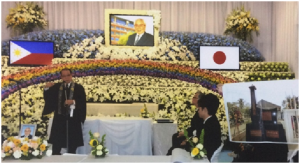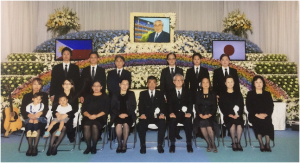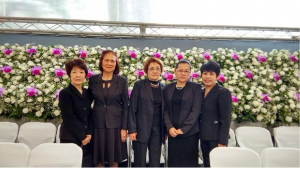SAYONARA UCHIDA OTOSAN… TILL WE MEET AGAIN…By: Ines p. Mallari
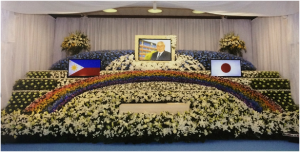
It was last May 7, 2016, in Tokyo, Japan, when Datu Bago Tatsuo Uchida or “Otosan” joined our creator. His passing was truly a great loss for me and my family… and we will forever miss our very loving Japanese father who never failed to give us words of wisdom and advices. The PNJK family also lost a philanthropic sponsor who possessed incomparable altruistic traits like donating lands and buildings that helped the organization grow and become what it is today. He also generously shared himself to become the “Otosan” of every Nikkeijin in Davao. He even brought the members of his family to Davao to help PNJK in some of our notable activities. Davao City likewise lost a good son, a Davao-born Japanese, who was a 2002 Datu Bago Awardee, and the Adopted son of Davao City, whose love for Davao was at par with or perhaps even greater than some of the Davaoeños.
Despite the deep sorrow that I felt due to the loss of a good father, I could still say that I was very fortunate to be able to personally bid Otosan farewell on April 18, 2016 when I visited him in the hospital in Tokyo where he was confined. I was together with his grandsons, Mr. Yusuke Uchida and Masaaki Uchida. Our last meeting was an emotional one for me especially when Otosan told me “Ines, kaerinasai or Go home, Ines” while holding my hand very tightly. Later, I learned that most of the Japanese parents who are already in their critical stage, would tell their children who visit them in the hospital to go home as a sign of concern to their children despite their unbearable condition.
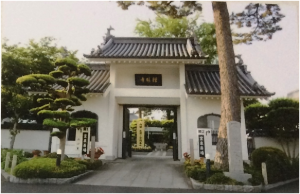 Last May 14, 2016, PNJK President, Judge Antonina Escovilla, who is considered as a sister of the late Uchida Otosan, my husband Winston Mallari and, Mr. and Mrs. Shuji Honda (relative of the late Ayako Uchida Okasan) flew to Tokyo in order to attend the necrological rites and burial of Otosan. Right after our arrival, we immediately went to the house of Kazunari san where Otosan’s body was laid in state. We saw him lying on the floor covered with white Japanese blanket or “Futon” from neck to toe, as if he was just asleep at the living room decorated by beautiful white fresh flowers. Surprisingly, the house did not bear the smell of dried flowers, candles, or medicines, the usual scent that permeate in funeral houses. Otosan’s body was preserved to appear like he was still alive and sleeping through the help of dried ice-packs that were regularly checked and replaced by the staff of Nitten Company (the funeral services company that Otosan single-handedly built).
Last May 14, 2016, PNJK President, Judge Antonina Escovilla, who is considered as a sister of the late Uchida Otosan, my husband Winston Mallari and, Mr. and Mrs. Shuji Honda (relative of the late Ayako Uchida Okasan) flew to Tokyo in order to attend the necrological rites and burial of Otosan. Right after our arrival, we immediately went to the house of Kazunari san where Otosan’s body was laid in state. We saw him lying on the floor covered with white Japanese blanket or “Futon” from neck to toe, as if he was just asleep at the living room decorated by beautiful white fresh flowers. Surprisingly, the house did not bear the smell of dried flowers, candles, or medicines, the usual scent that permeate in funeral houses. Otosan’s body was preserved to appear like he was still alive and sleeping through the help of dried ice-packs that were regularly checked and replaced by the staff of Nitten Company (the funeral services company that Otosan single-handedly built).
On May 15, we witnessed how the Nitten staff carefully and courteously changed the attire of Otosan and prepared him for his funeral rites. We also partook of the send-off rites by placing him inside the wooden coffin that was carried by the funeral car to Jinrenji, the well- embellished and very big temple where the necrological service in honor of Uchida Otosan was held.
Jinrenji temple’s entrance, reception, waiting area, and most especially the ceremony hall were sights to behold because of the well-arranged and beautiful fresh orchids and other flowers in bloom like the Cattleyas, Roses, Gerberas, Stargazers, Carnations, and many more. The ceremony hall appeared like it was a garden of paradise filled with colorful and attractive flowers. However, the most impressive decoration at that time was the rainbow-themed fresh flowers that were nicely arranged on top of the coffin and below the huge picture of Otosan with the Philippine and Japanese flag that were prominently displayed on each side. The decoration reminded me of the kind of person that Otosan was during his lifetime: a full-blooded Japanese who was born in Davao City; a survivor who suffered a lot and strived hard during the difficult times during and after the war, and through his industry and hard labor became very successful in his business in Japan; a Davao-born who loved Davao City so much that he generously donated his hard-earned money in order to help the orphans in Davao and the poor sector in this part of the country, especially in the education of the youth; the Otosan who helped the war-displaced Japanese descendants in our fight for recognition; a benevolent donor who helped made PNJK Inc., a strong organization and; the rainbow bridge that ably connected Philippines and Japan.
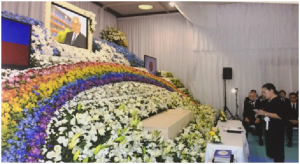 The necrological service was attended by more or less 500 friends and relatives of Uchida Otosan. It became a reunion of some sort when we met familiar faces like the JPVA officers headed by the president, Mrs. Masumi Yagi, Otosan’s friend and long-time colleague , Masataka Ajiro Sensei, the officers and members of the Tokyo Kichijoji Lions Club, especially Atty. Hideshige Aoki, Mr. Kiyohito Takigawa, and the rest of their colleagues, Mrs. & Mrs. Hedechika Nakada and Mrs. Masako Nakada Suzuki, Davao-born , Mrs. Shoko Ogawa, former JPIC president, Mr. Akira Sekino, former JPVA vice-president, Mr. Kenshu Sasaki, Coach Hidetoshi Suzuki, our fellow nikkeijin Joy Tanaka, and many more.
The necrological service was attended by more or less 500 friends and relatives of Uchida Otosan. It became a reunion of some sort when we met familiar faces like the JPVA officers headed by the president, Mrs. Masumi Yagi, Otosan’s friend and long-time colleague , Masataka Ajiro Sensei, the officers and members of the Tokyo Kichijoji Lions Club, especially Atty. Hideshige Aoki, Mr. Kiyohito Takigawa, and the rest of their colleagues, Mrs. & Mrs. Hedechika Nakada and Mrs. Masako Nakada Suzuki, Davao-born , Mrs. Shoko Ogawa, former JPIC president, Mr. Akira Sekino, former JPVA vice-president, Mr. Kenshu Sasaki, Coach Hidetoshi Suzuki, our fellow nikkeijin Joy Tanaka, and many more.
The necrological service began at exactly 6:00 o’clock in the evening with a video showing the life and accomplishments of Otosan. Thereafter, the President of the Federation of Funeral Services in Tokyo delivered his message as one of otosan’s colleagues in business. Coach Hidetoshi Suzuki likewise gave his message. I was also given the privilege to speak on behalf of PNJK, MKD, PNJK-IS, and the rest of the Dabawenyos who were beneficiaries of Otosan’s philanthropic activities. I was not able to hold the tears that kept on falling from my eyes due to the uncontrollable emotions that I felt at that time. No word will ever be enough to encapsulate my feelings that wish to thank a great person, our Otosan, for his immense kindness, his sincerity, and his love for Davao, and the Davaoeños. After the three messages, Mr. Kazunari Uchida delivered his words of gratitude to the large number of people who came to the necrological rites. The last part of the rite was the floral offering by all those in attendance. Afterwhich, the attendees were ushered to the different halls inside the vast temple where dinner was served.
In the morning of May 15, the final funeral service prior to the cremation and burial of Otosan took place. The flow of the program was almost the same with the necrological rites except that there were different set of speakers and most of the attendees were those who were not able to come during the necrological service. Ajiro Sensei spoke elaborately on his activities with Otosan and their achievements as a team. Likewise, Mr. Shuji Honda rendered an original song that befitted the very solemn occasion.
We would have wanted to join the family in witnessing the cremation ceremony and in bringing Otosan to his final rest but due to our prior commitments that couldn’t be changed, Judge Escovilla, my husband Winston and I, left before the ceremonies concluded, in order to catch our plane back to Davao City.
Otosan once said that the reason why he always come back to Davao to help is because he considered Davao City as his “Furusato” or his motherland.
He also said that “even the birds in the sky, the creatures of the sea, and the animals of the land would return to the place where they were born, thus, it is a must that we-human beings should go back to the place where we were born or to our Furusato”.
I sincerely hope that all Nikkeijins will engrave into their hearts and minds the memory of a wonderful person-the late Tatsuo Uchida, who was born on January 25, 1928 at Tibungco, who enjoyed his youth while residing in Magallanes St., who could never forget the fun memories that he had during his studies at the Japanese school in Bolton St. in the company of his Filipino and Japanese friends including the the late Mayor Elias Lopez, and who diligently worked in Calinan, Davao City. Indeed, Otosan was everywhere in Davao and…I believe that he will continue to be everywhere in Davao, his beloved furusato.

